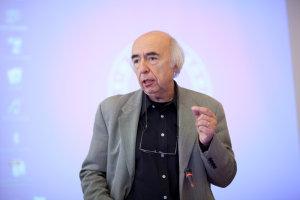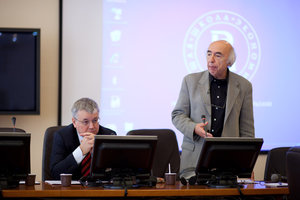Jacques-Francois Thisse: ŌĆśYou Need To Be Close In Order To Act PromptlyŌĆÖ
On October 3rd Jacques-Francois Thisse, Professor of Economics and Regional Science at the Universit├® catholique de Louvain (Belgium) gave a press conference at the Higher School of Economics.
 |
| Jacques-Francois Thisse |
On October 3rd Jacques-Francois Thisse, Professor of Economics and Regional Science at the Universit├® catholique de Louvain (Belgium) gave a press conference at the Higher School of Economics.
Before the press conference, Prof. Thisse met Yaroslav Kuzminov, Rector of the HSE, and other staff of the university. Thečä Rector congratulated his colleague on his recent victory (reported recently in HSE News) and said that Jacques-Francois Thisse will lead the fourth international laboratory at the HSE supported by the Ministry of Education and Science. This laboratory is the first economical one with the other three being in sociology (headed by Ronald Inglehart), mathematics (headed by Fedor Bogomolov) and information technology (headed by Panos Pardalos).
Prof. Thisse spoke about his work as a lecturer, researcher and organizer of science. Today he is Professor at the Universit├® catholique de Louvain Centre for Operational Research and Economics (CORE), Professor at ├ēcole Nationale des Ponts et Chausses in Paris and a member of the Advisory Council at the Toulouse School of Economics (France). He is involved in research into spatial economics, new economic geography, regional economics, integration and agglomeration economics, interregional and international trade, industrial market analysis and operational studies and he is also the author of over 250 articles in peer-reviewed journals.
J.-F. Thisse is also known as scientific work organizer. In particular, he was a founder of the CORE center and was President between 2000-2006. From 1992-1996 he was Director of CERAS ŌĆō a globally renowned center for economic studies in Paris. Together with R. Guesnerie he initiated the foundation of the Paris School of Economics and was one of the organizers of the European Economic Association and its journal.
 |
| Yaroslav Kuzminov and Jacques-Francois Thisse |
It is expected that the Laboratory will continue its work after the ending of financial support from the Ministry of Education and Science. As part of the work, a masterŌĆÖs programme in spatial economics will be launched, and this will raise economic education in Saint Petersburg to a totally new level.
The first task to be solved is the creation of a team consisting of 5 or 6 researchers who will later be joined by young researchers, national and foreign experts and students. According to Prof. Thisse, ŌĆśleading researchers should not be invited just for one or two days, but for at least a week so that their work will be even more effectiveŌĆÖ.
The laboratory will be an attractive workplace both for staff members and for visiting researchers and will have workspace and seminar rooms with videoconference equipment. The laboratory will hold regular seminars in English which should attract both undergraduate and masterŌĆÖs students. In order to integrate the laboratory into the HSE structure, it is necessary to create an environment for permanent communication.
Another important task is to strengthen ties with research centers in Europe, primarily with the London and Paris schools of economics. The list of expected academic partners includes CORE, the Tokyo University and will be constantly updated. ŌĆśThere are small centers in Europe which can also provide us with knowledge. I hope also that we shall be able to establish cooperation with some Russian universities and researchersŌĆÖ J.-F. Thisse said.
In line with the terms of the contest, Prof. Thisse is planning to spend at least four months a year in Russia, and to make this work regular, he will come for about a month each time in summer, autumn, winter and spring. In addition to this, some laboratory staff will visit some foreign universities.
Yaroslav Kuzminov mentioned that primarily, it was necessary improve the quality of research. The rector promised to provide support for data collection and explained that he was very keen include the laboratory in global academic networks, including through promoting academic mobility of its staff.
At the press conference Prof. Thisse gave some specific examples of topics for research. Recently, the role of urban agglomerations has grown rapidly. The GDP of New York or Tokyo is larger than that of the whole of India. It is therefore important to understand why this is happening, what factors promote economic growth and what promotes innovations. ŌĆśWhy do people spend huge sums of money to live in London or Tokyo where the cost of living is the highest in the world?ŌĆÖ asks J.-F. Thisse. And he answers: ŌĆśBecause it is important to be nearby, in order to act rapidly. This gives an advantageŌĆÖ.
In Europe there are many big cities but economically, according to Thisse, the competitors of New York or Tokyo can only be London, Paris, Berlin and Moscow. Shanghai is a successful example of agglomeration. But there is also a negative example ŌĆō Kinshasa, the capital of Central African Republic where the population is growing but economy is not developing.
Another topic for research in the new laboratory might be the problem of the relationship between monopolies and the state. According to J.-F. Thisse, if a government is influenced by monopolies, this means hidden corruption. If monopolies are totally controlled by the government, this slows down economic development. The most important thing is not to let the government and monopolies bind together ŌĆō this can be avoided through a system of regulation, but both the specifics of the situation and existing traditions need to be taken into account.
Summarizing the press conference, Jacques-Francois Thisse commented on one more task which he is setting both his laboratory staff and himself. ŌĆśIt is important to understand that an academic does not sell a ready-made result. In economics, intuition plays a big role. There are no universal models, it is necessary to take into account a lot of nuances, and ideas appear through knowledge and contradictions. This is what should be developed in students and young researchers as a priority, and unfortunately many international universities lack thisŌĆÖ.
Andrey Shcherbakov, HSE News Service
